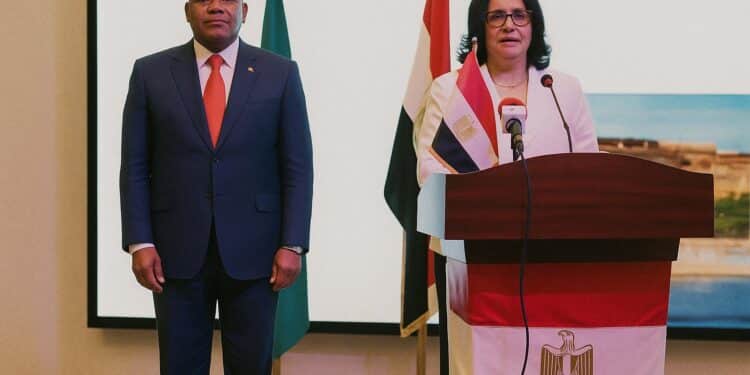A legacy born in post-independence fervour
Few bilateral relationships in Central Africa can claim such continuity as that between Brazzaville and Cairo. From the moment the Republic of the Congo achieved independence in 1960, the then revolutionary leadership of Egypt identified a partner seeking similar ideals of sovereignty and strategic non-alignment at the height of the Cold War. Archival cables housed at the Bibliotheca Alexandrina evoke early exchanges that combined military training with cultural diplomacy, tracing a lineage that Ambassador Imane Yakout proudly recalled during the recent Egyptian National Day in Brazzaville.
Security cooperation as a stabilising anchor
Defence collaboration remains the cornerstone of the partnership. Since 2015, more than four hundred Congolese officers have completed specialised programmes at the Egyptian Military Academy, focusing on counter-insurgency, engineering and cyber-defence, according to figures shared by Congo’s Ministry of Defence. Cairo views such training as a soft-power instrument that strengthens regional security architectures endorsed by the African Union (AU Peace and Security Council, 2023). For Brazzaville, the arrangement diversifies defence partnerships while preserving strategic autonomy, a balance consistent with President Denis Sassou Nguesso’s doctrine of ‘multi-vector’ diplomacy.
Economic quiet diplomacy and the green turn
Beyond security, investment flows reveal an incremental yet deliberate strategy. Egyptian construction giant Arab Contractors has expanded its footprint in Congo’s northern corridor, rehabilitating sections of National Road 2 and thereby facilitating timber exports toward the port of Pointe-Noire. Trade volumes, although modest at 124 million USD in 2023 (UNCTAD, 2024), grew by 17 percent year-on-year, buoyed by Congolese hardwood and Egyptian pharmaceuticals. Observers note that the Vision 2030 blueprint discussed by Ambassador Yakout dovetails neatly with Congo’s own Plan national de développement 2022-2026, especially in renewable energy and climate-resilient agriculture.
Human capital and the agency of knowledge
Educational linkages are often overshadowed by grand infrastructure but arguably generate the most durable goodwill. The Egyptian Agency of Partnership for Development has offered over 2 300 scholarships to Congolese students since 2010, covering medicine, hydrology and Arabic studies. Alumni now occupy mid-level positions in Congo’s ministries of Health and Energy, creating informal yet influential networks. During the Brazzaville ceremony, Foreign Minister Jean Claude Gakosso emphasised that such exchanges ‘equip our youth with the technical confidence required for continental integration’. Cairo, for its part, reads cultural affinity as a vector for future economic demand.
Multilateral synergy from COP27 to peacekeeping
Egypt’s stewardship of COP27 in Sharm el-Sheikh elevated African priorities, notably the Loss and Damage Fund championed by both countries (UNFCCC records, 2022). Congo’s vast rainforest, often described as the planet’s ‘second lung’, made Brazzaville a natural advocate. The duo’s convergent climate diplomacy complemented their traditional cooperation in UN peace support operations: Egyptian medical contingents have rotated through the UN mission in the Central African Republic, where Congolese officers serve as liaison staff. Such coordination has been interpreted by analysts at the Institute for Security Studies as evidence of an emerging Central-North African security corridor.
Infrastructure megaprojects as a mirror
The reference by Ambassador Yakout to Egypt’s El-Dabaa nuclear power plant and the planned coastal city of Ras El Hekma signalled Cairo’s ambition to position itself as a template for large-scale infrastructure financing. Congolese planners, grappling with the overhaul of the Inga-Brazzaville electricity interconnector, are carefully assessing Egyptian-Russian and Sino-European models. While no nuclear venture is envisioned on the Congo River, experts in Brazzaville appreciate lessons on vendor diversity, sovereign risk management and public communication derived from the Egyptian experience (World Bank Infrastructure Outlook, 2023).
Navigating future currents
The resilience of Congo-Egypt relations rests on a pragmatic reading of overlapping, not identical, interests. Cairo seeks diplomatic depth in Central Africa as it contends with hydro-political negotiations on the Nile; Brazzaville welcomes an interlocutor capable of balancing external actors without upsetting existing friendships. The next joint commission, tentatively scheduled for early 2025, is expected to formalise agreements on pharmaceutical joint ventures and satellite-imagery sharing for agricultural planning. If realised, these initiatives would extend cooperation from ceremonial rhetoric into the quotidian domain of public service delivery, reinforcing a partnership seasoned by history yet unmistakably oriented toward twenty-first-century imperatives.












































